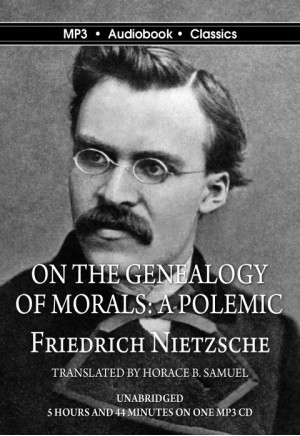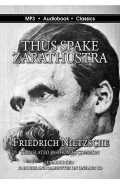| Track | Section | Length |
| 1 | 00 - Preface | 22:23 |
| 2 | 01 - First Essay Part 1 | 38:02 |
| 3 | 02 - First Essay Part 2 | 36:10 |
| 4 | 03 - Second Essay Part 1 | 52:07 |
| 5 | 04 - Second Essay Part 2 | 42:34 |
| 6 | 05 - Third Essay Part 1 | 50:47 |
| 7 | 06 - Third Essay Part 2 | 48:54 |
| 8 | 07 - Third Essay Part 3 | 52:40 |
Notes
Running Time: 5 hours 43 minutes
Read by: Jeffrey Church
Book Coordinator: Jeffrey Church
Meta Coordinator: Availle
Artwork
Cover: Friedrich Nietzsche circa 1875 by F. Hartmann, Basel.
Inset: Portrait of Friedrich Nietzsche, 1882, by photographer Gustav Schultze.
Recordings
These recordings were made using the author’s original published work, which is in the public domain. The readings were recorded by members and volunteers of Librivox.org, which has generously made the recordings available to the public domain. The audio files have been lightly edited and have been engineered using professional audio tools for maximum sonic quality. While Librivox condones the sale and distribution of these recordings, it is not associated with the management or operations of MP3 Audiobook Classics.
- Download and read the PDF online at Cambridge University
- Download a PDF datasheet
Friedrich Nietzsche set out to dig into “the origin of our moral prejudices” in On the Genealogy of Morals, also titled On the Genealogy of Morality: A Polemic. In doing so he carried forward his thinking expressed first in Human, All Too Human (1878) and more deeply in Beyond Good and Evil (1886). Consisting of a preface and three extended treatises, it is the most systematic of his works, and considered as his masterpiece by many scholars. The first treatise outlines two very concepts of good that eventually oppose one another. The first exists paired with “good and bad”, a dualism of pure power characterized by the Roman worldview, while the second exists in the “good and evil” dualism characterized by the “ressentiment” of the meek and powerless in the Judeo-Christian tradition. The second treatise delves into the roots of guilt and punishment in anger and the need for compensation, and poses the notion of “bad conscience” as will to power unnaturally turned inward. The third treatise deals with ascetic ideals from the several perspectives of artists, philosophers, women, priests, saints, and, more recently, scientists and historians. He fears that the “will to truth” which is fostered by the ascetic ideal may well foster a truth that then imperils its objective. By applying the historical technique of genealogy to the birth, scope and decline of ideologies over time, Nietzsche brings a Darwinian perspective to the evolution of ethics, and, by doing so, gives a deeper understanding of “the value of our values”.
Play sample:
Download a PDF datasheet
| Item Info | |
| EAN - DVD case | 0683422134678 |
| EAN - CD jacket | 0682550992341 |
| Media | MP3 CD |
| Package | DVD case, CD jacket, CD security sleeve, download |
| Author | Friedrich Nietzsche (1844 - 1900) |
| Translator | Horace B. Samuel |
| Year | 1887 |
| Recording | |
| Read by | Jeffrey Church |
| Length | 5 hours and 43 minutes |
| Type of Reading | Solo |
On the Genealogy of Morals
- Author: Friedrich Nietzsche
- Product Code: DB-1152
- Availability: In Stock
-
$9.99
Available Options
Related Products
Beyond Good and Evil
Beyond Good and Evil: Prelude to a Philosophy of the Future is the second of four seminal late perio..
$9.99
The Antichrist
The German title of The Antichrist, Der Antst, translates into English as “The Anti-Christian” as we..
$9.99
Thus Spake Zarathustra
“God is Dead”. “The Superman”. The “will to power”. We’ve all heard the phrases, which a..
$11.99










